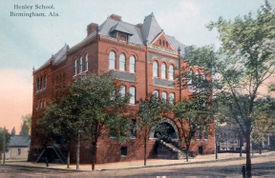Henley School: Difference between revisions
m (→Principals) |
No edit summary |
||
| Line 1: | Line 1: | ||
[[File:Henley School postcard.jpg| | {{Infobox former school | ||
|name =Henley School | |||
|image =[[File:Henley School postcard.jpg|275px]] | |||
|years=[[1883]]– | |||
|grades =1-7 | |||
|enrollment = | |||
|enroll-year = | |||
|colors = | |||
|mascot = | |||
|address =1700 [[6th Avenue North]] | |||
|city = Birmingham | |||
|map =({{Locate_address_inline | address = 1700+6th+Ave+N | zoom=17 | type=h }}) | |||
|district = [[Birmingham City Schools]] | |||
}} | |||
The '''Henley School''' was a [[Birmingham City Schools|Birmingham city school]] located on the northeast corner of [[17th Street North|17th Street]] and [[6th Avenue North]] near [[Kelly Ingram Park|West End Park]] (on the present site of the [[Alabama Power Company parking deck]]). | The '''Henley School''' was a [[Birmingham City Schools|Birmingham city school]] located on the northeast corner of [[17th Street North|17th Street]] and [[6th Avenue North]] near [[Kelly Ingram Park|West End Park]] (on the present site of the [[Alabama Power Company parking deck]]). | ||
The school was founded in November [[1883]] as the '''West End School''' or '''West End Grammar School'''. It was | The school was founded in November [[1883]] as the '''West End School''' or '''West End Grammar School'''. It was renamed later that decade in honor of Birmingham's first [[Mayor of Birmingham|Mayor]], [[Robert Henley]]. | ||
After the [[Barker School]] burned in [[1941]], Parent-Teacher Association president [[Harry Singler]] labelled [[Powell School|Powell]] and Henley Schools as "firetraps" and suggested that the board tear them down and replace all three with a single, modern combined school in a central location, presumably downtown near the existing Powell School site, but eventually the insurance settlement was used to expand the [[Seventeenth Avenue School]] instead. | After the [[Barker School]] burned in [[1941]], Parent-Teacher Association president [[Harry Singler]] labelled [[Powell School|Powell]] and Henley Schools as "firetraps" and suggested that the board tear them down and replace all three with a single, modern combined school in a central location, presumably downtown near the existing Powell School site, but eventually the insurance settlement was used to expand the [[Seventeenth Avenue School]] instead. | ||
On Palm Sunday, [[April 7]], [[1963]] a group of 2,000 marchers were stopped near the school and ministers [[John | On Palm Sunday, [[April 7]], [[1963]] a group of 2,000 marchers were stopped near the school and ministers [[John Porter]], [[Nelson Smith]] and [[A. D. King]] immediately knelt in prayer. Twenty-six of the marchers were arrested as onlookers were dispersed with police dogs. | ||
{{stub}} | {{stub}} | ||
Revision as of 16:11, 20 December 2017
| Henley School | |

| |
| Active | 1883– |
|---|---|
| School type | Public |
| District | Birmingham City Schools |
| Grades | 1-7 |
| Colors | |
| Mascot | |
| Location | 1700 6th Avenue North, (map) Birmingham |
The Henley School was a Birmingham city school located on the northeast corner of 17th Street and 6th Avenue North near West End Park (on the present site of the Alabama Power Company parking deck).
The school was founded in November 1883 as the West End School or West End Grammar School. It was renamed later that decade in honor of Birmingham's first Mayor, Robert Henley.
After the Barker School burned in 1941, Parent-Teacher Association president Harry Singler labelled Powell and Henley Schools as "firetraps" and suggested that the board tear them down and replace all three with a single, modern combined school in a central location, presumably downtown near the existing Powell School site, but eventually the insurance settlement was used to expand the Seventeenth Avenue School instead.
On Palm Sunday, April 7, 1963 a group of 2,000 marchers were stopped near the school and ministers John Porter, Nelson Smith and A. D. King immediately knelt in prayer. Twenty-six of the marchers were arrested as onlookers were dispersed with police dogs.
Principals
- Annie Provost and Kate Knox, 1883
- George Brewer, 1884
- Albert Jonas
- J. B. Dell
- Frank Roof, 1887-1897
- Charles A. Brown, 1897-1907
- W. C. Griggs, 1907-
- J. M. Burnett
References
- City Directory of Birmingham and Gazetteer of Surrounding Section for 1884-5 (1884) Volume II. Atlanta, Georgia: Interstate Directory Company
- Cruikshank, George H. (1920) History of Birmingham and Its Environs: A Narrative Account of Their Historical Progress, Their People, and Their Principal Interests 2 volumes. Chicago, Illinois: Lewis Publishing Company. - via Birmingham Public Library Digital Collections